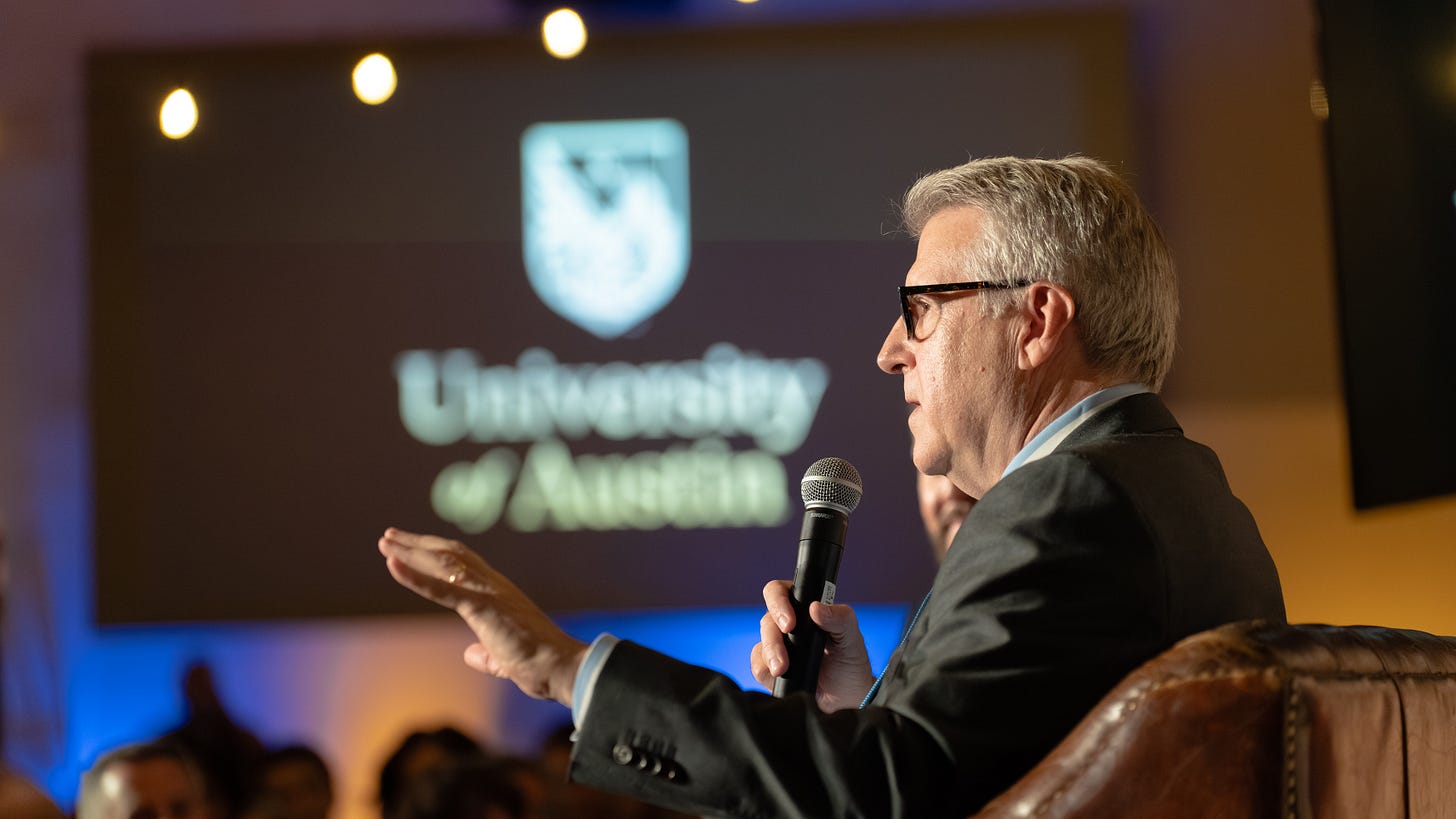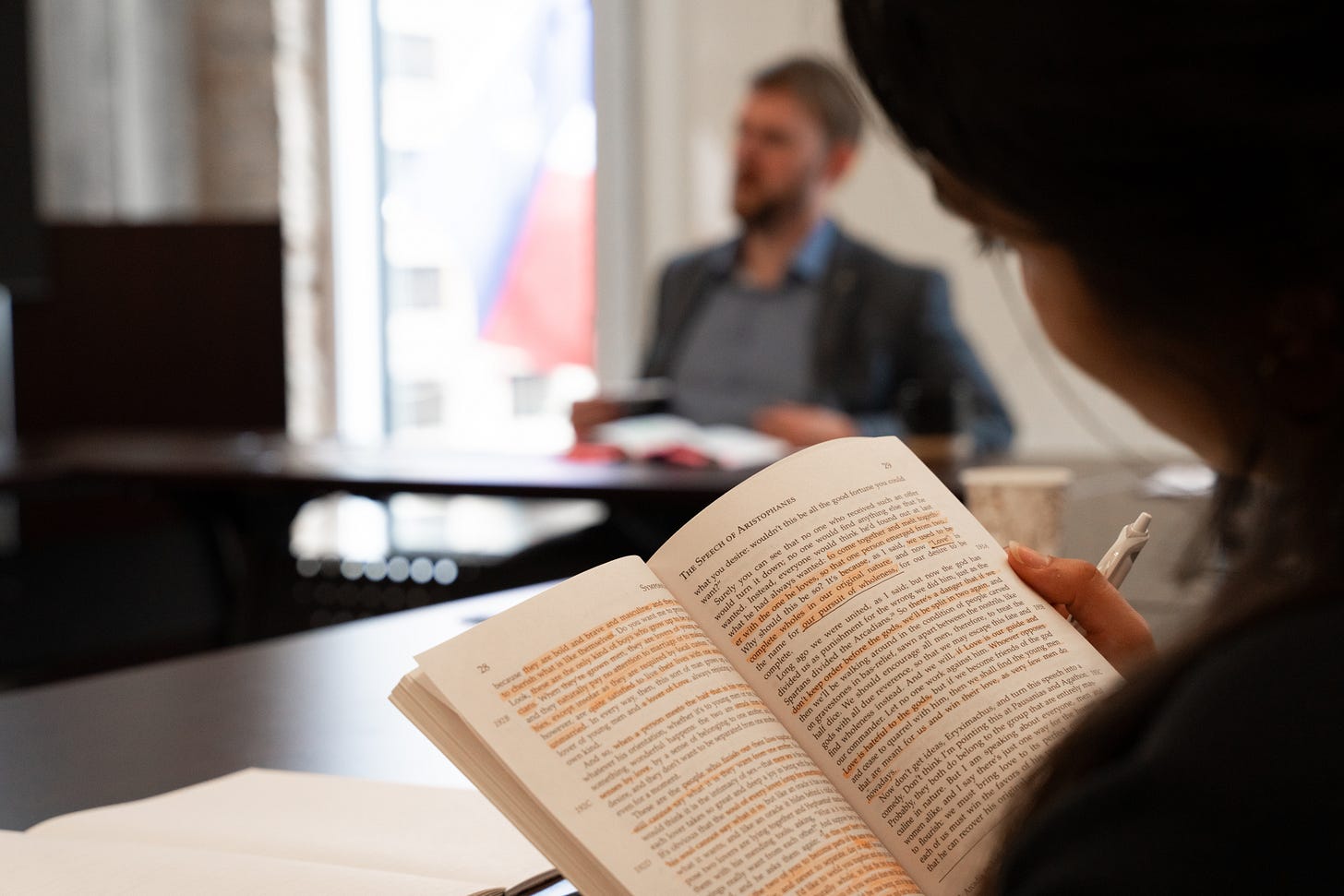Why Men Should Love Poetry
Professor Clay Greene champions 'the manliness of sentiment.' Plus: Watch the full story of Ronald Reagan's era-defining speech.
Young women know they like poetry. Young men need to be shown they do. — Professor Clay Greene
I may have the most interesting job in the world. Not a day goes by at UATX without extraordinary conversations with brilliant people. Our professors are accessible and generous with their time.
Last week, I interviewed Clay Greene, assistant professor of literature, about his time at the University of Austin, manliness in poetry, and the upheavals of the seventeenth century.
Greene completed his Ph.D. at Yale University and a postdoctoral fellowship at the Hamilton Center for Classical and Civic Education at the University of Florida. I asked what drew him to UATX.
“Old institutions have to start as young institutions,” he said. “Sometimes people talk as if we are in the twilight of the university, but the University of Austin looks to me like a new dawn.
“I've never been a part of a university where I could have such a direct and tangible effect through teaching and service. I have hopes that this university will see the next century and put up a record to rival even the old schools.
“We are doing something different, teaching with an open mind, exploring all sides of the important questions, encouraging disagreement and debate. We have an ideological range far closer to the actual range of the country than other universities. It's exciting, and it's necessary.”
When asked what impressed him about his first term at UATX, Greene spoke of “the power of community.”
“The faculty offices are (right now) right in the middle of the student common areas,” he said. “Once a week, the faculty and students gather for dinner and to hear a lecture. I have regular chats with my students, occasionally lose a game of chess to them, and listen in as they play banjos or guitars or chat among themselves. No school I've attended has had such a solid community. I wouldn't trade it for the world.”
Greene specializes in early modern literature and culture, particularly the study of John Milton, but he has not always cared for verse.
“I always loved literature, but I was a late bloomer in poetry,” he said. “I attended an arts high school with a specialization in creative writing. All of my teachers were wonderful and were working writers. But their tastes were for post-1970 poetry, which mostly failed to capture my interest. So I thought I didn’t like poetry, with a few small exceptions, until I encountered Tennyson’s ‘Ulysses,’ read aloud. It was a life-changing experience. I gobbled up the rest of Tennyson, starting with Idylls of the King. From there, it was a natural path to the rest of pre-modern poetry.
“As C. S. Lewis said, ‘It does not matter at what point you first break into the system of European poetry. Only keep your ears open and your mouth shut, and everything will lead you to everything else in the end.’”
Yet, according to Greene, not all students are equally receptive at first.
“Young women know they like poetry,” Greene said. “Young men need to be shown they do. The topics of poetry are as extensive as life. War, civilization, ambition, discovery—and love and death, of course. Poetry isn’t only about ‘private feelings.’ It isn’t even clear that anyone’s feelings are private.
“I knew early on that I was interested in visionary experiences, the feeling of knowledge and experience that transcended ordinary consciousness, if only for a flash. I was far from the only young man like that, and Milton, Wordsworth, Blake, and Keats are practically designed to fulfill that bent.
“But to say a little more about men and poetry. Men today, and perhaps for the last seventy or so years, are inclined away from the expression of sentiment. They think it ‘unmanly.’ Yet in the eighteenth century, for example, soldiers, generals, and kings wrote lavish letters of affection to their male friends, let alone their beloveds. The men of today who think the expression of sentiment unmanly should see General James Wolfe with his boots blacked with mud and a bullet through his heart, fighting for the honor of his country. They would learn something about the manliness of sentiment.
“Most of the pre-modern poetry we have was written by men. It is waiting for men to rediscover it and, in the process, rediscover the connection of manliness and sentiment.”
Poetry is also about the connection between pleasure and wisdom, “often in surprising mixtures,” he continued. “As Aristotle knew, encountering heartbreak and pain in poetry is surprisingly sweet and rewarding.
“‘Terrence, this is stupid stuff’ by A.E. Housman gets the idea across. A king drank a little poison with his sweet wine every day. When his courtiers tried to poison him, he was resistant: ‘I tell the tale that I heard told / Mithridates: he died old.’ So while there are many benefits, I am especially impressed by poetry’s capacity to help us turn sorrow into joy and vision.”
I asked Greene which poems from the seventeenth century he would offer someone with no background or prior interest.
“The seventeenth century was a time of destruction and rebirth, especially for England, but really for all Europe,” he said. “The century begins with Aristotelian physics reigning supreme and Ptolemaic astronomy popular but challenged, and it ends with Newton, Copernicus, and Kepler largely accepted as truth. It begins with the king of England authoring a book on divine right monarchy and sees the English people execute their own monarch in 1649 and depose and replace a different monarch in 1688.
“In aesthetics, the changes are no less striking. A book written in 1600 and another written in 1750 will almost appear to be written by two different civilizations. Nearly all the medievalism, the constant cadence of scriptural citation, the copious appeal to classical and patristic authorities, are gone. In poetry, all the shagginess, the wilderness quality of medieval verse that persists in the works of Shakespeare and Milton, is purged. From the point of view of aesthetics, science, religion, and politics, you get the sense that the eighteenth century has settled into a new order, with new driving questions but also newly firm assumptions.
“Not so the 1600s. They were at sea, in chaos and flux. Their old medieval images of state, humanity, nature, and the cosmos persisted, but they were bleeding images. The mythic structures were letting in water, and people knew it. That’s what gives seventeenth-century poetry its special interest: the struggle of a civilization simultaneously collapsing and reemerging.
“With this in mind, I would recommend a few poems: John Donne’s ‘First Anniversary,’ Andrew Marvell’s ‘Horatian Ode Upon Cromwell’s Return From Ireland,’ and ‘They are all Gone into the World of Light’ by Henry Vaughan, his dirge for the Civil War-slain. In those the struggle for meaning amidst civilizational collapse is clear. But you can observe the same problem in Marvell’s ‘To His Coy Mistress.’
“That said, if you want to see this dynamic in all its brutal splendor, there’s only one thing for you: Milton’s Paradise Lost.”
→ ”Before a poem is a text, it is a performance”: Read Clay Greene in Education Next on why poetry should be read aloud.
→ “Here thought is dared, and truth pursued”: For more insight into the manliness of sentiment, check out UATX Creative Director Stephen Plodinec’s recent poem about his experience at UATX, “The University, Renewed.”
How Words Tore Down a Wall
Last week, I wrote about renowned speechwriter Peter Robinson’s visit to UATX to tell the story of former President Ronald Reagan’s “Tear Down This Wall” speech. Reagan made history in West Berlin on June 12, 1987, by delivering Robinson's address despite opposition from top advisors. Here's Robinson on how Reagan did it, particularly how his habits as a reader prepared him to take on what Reagan called "the Evil Empire”:
Apply for our Strauss Symposium
The University of Austin is hosting a symposium on the writings of the great 20th-century political philosopher Leo Strauss on January 4-10, 2025. Applications, which are due by November 24, are live.
Tuition, accommodations, and meals will be provided free of charge to all participants. Students will stay in downtown Austin, Texas, and attend seminars at the University of Austin campus. Readings draw from various works by Leo Strauss, including Natural Right and History, Persecution and the Art of Writing, Studies in Platonic Political Philosophy, and “Three Waves of Modernity.”
Applicants must be at least 18 years old and either currently enrolled undergraduates or recent graduates no more than two years out from their date of graduation.
All participants who live outside the greater Austin region will receive up to a $599 travel reimbursement for economy airfare.
More information is available here.
A Message from The Mill Institute
The Mill Institute at UATX works to promote an open and rigorous exchange of ideas across high school and university communities and classrooms. Their programs and resources create a foundation for open dialogue, helping students challenge the belief that sensitive topics tied to identity, justice, or equality have obvious or easy answers.
This month the Mill Institute conducted a two-day training with the Beverly Hills Unified School District, working with over 200 K-12 teachers and administrators. In addition to discussing the work of John Stuart Mill as a group, the training focused on the importance of establishing classroom ground rules and norms for discussing contentious topics. This training drew on materials from the Mill Institute’s Viewpoint Diversity Challenge, as well as the Mill Institute’s ground rules and Reflection Questions for students.
“We work to facilitate change in schools at the cultural level,” said Ellie Avishai, Executive Director of the Mill Institute. “When schools and districts make a commitment to open inquiry, students gain the confidence and skills to engage across ideological and political divides and become better able to challenge oversimplified conclusions about complex topics.The Mill Institute supports system leaders and teachers to articulate what this commitment sounds like - both in terms of how they communicate across their learning community and what norms guide people’s interactions.”
“I'm now turning my beliefs about open inquiry into action that will benefit students,” said one educator.
The Mill Institute has also facilitated high school and university programming focused on the ongoing conflict in the Middle East.
Interested in bringing the Mill Institute to your school? Reach out to Erin Cook (ecook@uaustin.org), Program Director for the Mill Institute.
Maggie Kelly is the Communications Manager at the University of Austin. Write to her at mkelly@uaustin.org.















The more I read about UATX the more I wish I was of college age again so as to be able to experience this extraordinary place of learning.
King David was a warrior and poet!